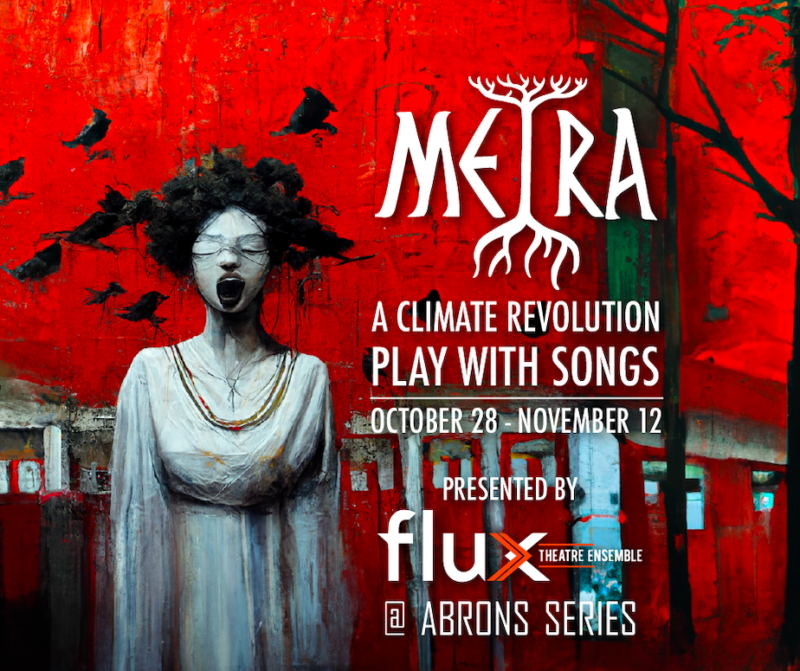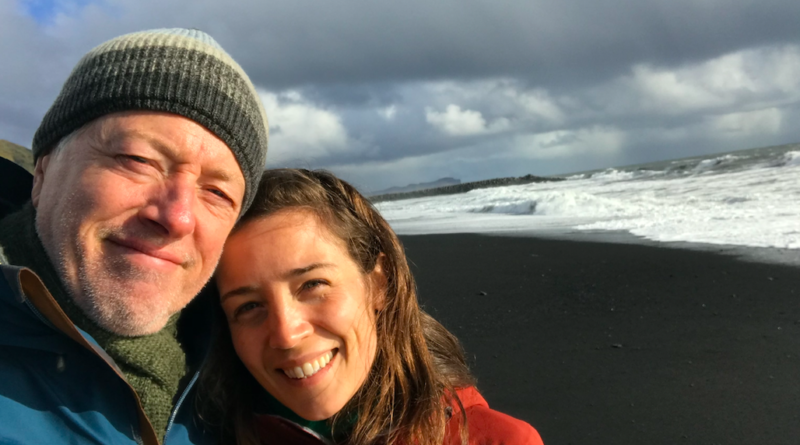INTERVIEW: In ‘Metra,’ audiences travel to 2045 to learn about today
Photo: Ned Hartford and Emily Hartford are the writers behind Metra: A Climate Revolution Play With Songs. Photo courtesy of the artists / Provided by Emily Owens PR with permission.
Metra: A Climate Revolution Play With Songs, written by the wife-husband team of Emily Hartford and Ned Hartford, is a new addition to the burgeoning movement in climate-centered theatrical drama. Several shows have played on and off-Broadway in recent years, showcasing dystopian futures and pondering the uncertain fate of planet Earth in light of the warming climate and looming current destruction of a world gone awry. Metra is unique in that the show takes the problems of today and advances them one or two steps forward, seeing how they may evolve (or devolve) in the future.
The year is 2045. No, there aren’t flying cars and Earthlings heading to Mars. Instead, the fossil fuel industry continues to dominate, and the rich are getting richer off “disaster capitalism.” It’s up to a group of revolutionaries to break the cycle of destruction and get the planet back on track, according to press notes.
Ned wrote original songs for the show, while Emily serves as the director. Their creative efforts are now on display at the Abrons Arts Center in New York City, with performances continuing until Nov. 19. Flux Theatre Ensemble, which is presenting the show, has a “no required financial transaction” policy for Metra, which is further explained below.
Recently Hollywood Soapbox exchanged emails with Emily and Ned. Questions and answers have been slightly edited for style.
How did the idea for Metra first come about?
EMILY: The project started as a series of devising experiments for me, about five years ago. I wanted to create something out of the myth of “Erysicthon” from Ovid’s Metamorphoses. I’ve had a love-hate relationship with that text for many years — I’ve always been drawn in by the magic and theatrical potential of its transformations … and repelled by its ubiquitous violence against women (and the casual attitude about that violence that seems to waft off of certain translations). So anyway — I wanted to mess one of Ovid’s stories up. It felt really freeing to play with the magic and demand better of the storytelling (which would become a key theme for Metra later). I started experimenting with prompts around the myth at a Flux Theatre Ensemble retreat and later hosted a series of exploratory workshops — all of which Ned was a part of as a creator.
Erysicthon gave us a lot to play with: The title character is an imperious king who believes his will and whim should rule over everything he can touch. When he cuts down a sacred grove of trees to spite the goddess Ceres, she curses him with insatiable hunger. The king eats everything in his kingdom down to nothing. And then, when there is nothing left to eat or sell for food, he turns to his daughter, Metra, and sells her off as well. She calls on Poseidon for help (more on that complicated dynamic if you see the show!), and he gives her the gift of shape-shifting, so that she can escape. The story ends with Erysicthon in a barren field, eating his own body down to almost nothing, until all that’s left is a wide-open, hungry mouth.
In the workshops, a brilliant and generous group of artists set upon a series of experiments and conversations around the themes that were screaming out from the text: disastrous consumption, extractive power systems, and the patriarchal/colonialist/racist compulsion for dominance and hoarding of power. We also asked: What’s the vision for an “alternative power system” — what is the antithesis of Erysicthon’s destructive hunger? That led us into a much more nature-rooted, more-than-human-kin space, and into visions for radical transformation (deeply inspired by adrienne marie brown’s structure for shaping-change, Emergent Strategy.).
After these workshops, Ned wrote a collection of songs inspired by the myth and our work together — gorgeous songs that I knew needed to be brought to life! Together, Ned and I worked out the concept for Metra as a climate revolution play, and then we dove into the writing of it.
Do you feel that addressing such an important issue as climate change in the theatrical realm leaves a lasting impact on the audience?
NED: I can only speak to what I think our show achieves. To honestly address the climate crisis, we have to address the systems of harm that have created and perpetuate that crisis. Otherwise, the “solutions” will continue to perpetuate the inequity and oppression that exists today. I think our show does a good job of addressing this complex issue in an entertaining and engaging way. And — says the immodest songwriter — people are going to walk out of the theatre humming the songs, softly singing the lyrics to themselves as they travel home, and those messages will subtly work their way into their souls. Yep, art is stealthy like that.
EMILY: Co-sign all of that! Flux is also setting up ways that the play can be a portal to climate action if audience members are so inspired. We’ve created a position on the show called Climate Action Designer, and we are lucky to have the brilliant eco-theatre artist and activist Jem Pickard filling that role. One key action that Jem is undertaking is creating materials that give audience members insight and connections into the climate justice movement, and ideas about getting involved.
Are you generally hopeful or pessimistic when considering the world’s collective future?
EMILY: I’m intrigued by the wording of this question (the use of “hopeful” rather than “optimistic”) because I really appreciate Rebecca Solnit’s perspective on hope: “Hope is an embrace of the unknown … Hope is not a lottery ticket you can sit on the sofa and clutch, feeling lucky. It is an axe you break down doors with in an emergency.”
So, I see “hope” as a really useful lens to consider the future. That definition means that I don’t have to pick Team Optimist or Team Pessimist — I can be really scared about the fact that the climate crisis is intensifying, I can be scared about deteriorating democracy and the ways that people I love are not safe. But that fear can sit right alongside a purposeful hope. As long as we recognize that the future hasn’t yet been written, we still have the power to remake the world now.
How do you ensure your characters feel real and authentic, and that they’re not simply passing on a message?
NED: Motivation and metaphor. Highly-motivated characters can deliver exposition that doesn’t feel like exposition. How these highly-motivated characters deal with the conflicts they encounter, and how they subsequently succeed or fail, can serve as metaphors for the larger “message.”
Could you step me through the “no financial transaction” aspect of tickets?
EMILY: Flux Theatre Ensemble first debuted the Living Ticket initiative in 2015, with a two-fold goal: One, we wanted to ensure that ability to pay was never a barrier of access to our work. Two, we wanted to build a model that worked toward paying artists a living wage. Instead of setting a ticket price, audiences are invited to support Flux in whatever way they can — a financial contribution, a donation of time or resources, or simply their engagement with the work.
Practically, this means you can reserve a ticket for $0, if that’s what works for you. But we also try to be as transparent as we can about the costs of making theatre in New York City and the value of the work of our artists. So, we also share budget information for each production, along with information about what levels of donation will help us build toward the goal of paying artists a living wage — in the hopes that folks who have the means will be inspired to make meaningful financial contributions to our work.
How did you work together? What was the division of tasks like?
EMILY: As I mentioned, many of the ideas that formed the foundation for Metra came out of the initial devising workshops for the project. Those workshops inspired Ned to write the first collection of songs for the show. Ned and I then hashed out an initial concept for the play together: that it would be based in this roadside bar, which housed a singing ancient Greek tree nymph and a group of climate revolutionaries — who would use the myth of Erysicthon to convert people to their cause.
Ned wrote the first draft, and then we passed drafts back and forth over the course of a few years. We wrote two of the roles for two of my fellow Flux Creative Partners, and we were able to bring the script in process into Flux’s new play development space, Core Work. Flux’s engagement with the play early on allowed us to have lots of big and invaluable conversations about how Metra could create a liberating narrative around climate change.
We’ve also done quite a bit of revising and honing during this rehearsal process! Ned has been the primary writer during this time period, as I’ve taken the big-picture, director-view. We’ve also been extraordinarily lucky to be shaping the play with a brilliant cast — several of whom are stellar playwrights in their own right. Cast members Corinna Schulenburg and Cherrye J. Davis have both contributed critical additional text to the play, and everyone has provided invaluable dramaturgical and character insight.
By John Soltes / Publisher / John@HollywoodSoapbox.com
Metra: A Climate Revolution Play With Songs, written by Ned Hartford and Emily Hartford, continues through Nov. 19 at the Abrons Arts Center in New York City. Click here for more information and tickets.


